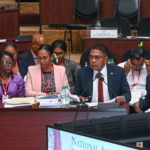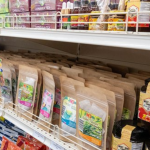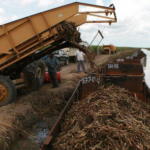Agriculture Minister Hon. Zulfikar Mustapha said that while Guyana is blessed with a diverse agricultural landscape, the country is not exempt from the immense global challenges that also impact agriculture and food security in countries in this part of the region.
Minister Mustapha made these remarks virtually while addressing Ministers of Agriculture and other officials from around the world at the United Nations Food Systems Summit (UNFSS+4).
He explained that the Government of Guyana has been making efforts to ensure traditional approaches evolve to address transforming agri-food system challenges, adding that has integrated food systems strategies into various national policies that promote sustainable development, livelihoods, nutrition, health, economic growth, and climate action.
“Guyana is endowed with abundant natural resources and a diverse agricultural landscape. However, we understand that these advantages come with considerable challenges, such as climate change, rising food prices, and the need to maintain food security. Guyana has integrated food systems strategies into various national policies that promote sustainable development, improved livelihoods, enhanced nutrition, improved health, economic growth, and climate action. Notably, the Low Carbon Development Strategy (LCDS) 2030 directly aligns with the national pathway for transforming food systems. This strategy emphasizes food security, climate resilience, and financing mechanisms that support sustainability and biodiversity preservation. Its goals include generating income while promoting initiatives for food security and climate resilience,” he explained
Minister Mustapha also said that the government has been collaborating with the local Private Sector to streamline local supply chains and ensure that farmers are able to deliver fresh, nutritious produce to consumers efficiently.
“The Government of Guyana understands the importance of public-private partnerships in enhancing our agri-food system. By working hand in hand with the private sector, we are developing undertaking key initiatives to streamline our supply chains and also ensure that our farmers can deliver fresh, nutritious produce to consumers efficiently. We believe that by fostering cooperation among all stakeholders, from producers to processors and retailers, we can counteract fragmentation and create a coordinated effort that stabilizes food prices and increases market access for our local agricultural products,” he noted.
Minister Mustapha also said that empowering smallholding farmers remains a key priority and that the government has been instituting various financial support mechanisms to help them invest in modern technologies.
“Empowering our smallholder farmers is also a key priority. We have instituted various financial support mechanisms, including low-interest loans, to help them invest in modern technologies. This financial empowerment is crucial to increasing their productivity and resilience, allowing them to thrive even in the face of challenges. Moreover, we are committed to creating an enabling policy framework that attracts investment in agriculture. We have introduced tax incentives and duty waivers for agricultural inputs, significantly reducing the financial burden on persons investing in the agriculture sector. Such measures are paramount for enhancing productivity. Our vision is clear; we aim for self-sufficiency, reducing our food import bill significantly while increasing local agricultural production. Our target includes key commodities such as poultry, corn, and rice, which are essential for both sustaining our population and ensuring regional food security,” Minister Mustapha underscored.
The session featured a dialogue between National Coordinators, international financial institutions, and the private sector during which they discussed investment opportunities and platforms that promote scalable and sustainable solutions, in line with the Secretary-General’s Call to Action, to ensure access to finance for food systems transformation. Investment opportunities in food systems transformation were also addressed.
Guyana was among 20 countries, which also included Belize, Bolivia, Brazil, Chile, Colombia, and the Dominican Republic, to participate in the thematic session.






